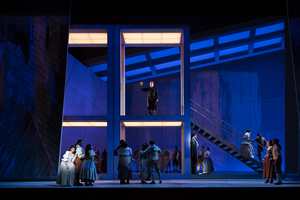Review: DON GIOVANNI at Washington National Opera

One of the greatest aspects of opera is the stories of universal truths and the complexity of human behavior and feeling. The story of Mozart's Don Giovanni has been around in some form for hundreds of years. In da Ponte's libretto, the arrogant libertine Giovanni leaves a wake of turmoil wherever he goes. He traumatizes Donna Anna, kills her father, keeps manipulating Donna Elvira, ruins Zerlina and Masetto's wedding, and beats up Masetto, pinning almost all of it on his servant Leporello. At the end, the statue of Donna Anna's dead father sees to it that Giovanni (spoiler alert) dies and goes to hell for his arrogance, deceit, and cruelty.
A story like this resonates deeply today in our world of Weinstein and Trump scandals, say nothing of James Levine and Placido Domingo's falls from grace. So, it was confusing that Director E. Loren Meeker seems to have encouraged a lot of stock gestures, blank faces, and sitting on the ground, all of which weaken the already-disempowered characters. Keri Alkema (Donna Elvira) and Kyle Ketelsen (Leporello) make the most sense of their roles. Alkema embraces Elvira's upper-class haughtiness, but never at the expense of her humor and empathy. Plus, she turns getting up from the floor in a huge dress into an art form! Ketelsen strikes a terrific balance between the buffo elements of the material and Leporello's growing frustration with his master's behavior. So why do Ryan McKinny (Giovanni), Vanessa Vasquez (Donna Anna), and Alek Shrader (Donna Anna's fiancé Don Ottavio) seem timid in roles that should present such terrific and experienced singers at their very best?
Musically, Saturday's performance began on shaky footing with timid strings and unfortunate playing from the horns in the Overture. Through the course of the first few scenes, things came together. Conductor Evan Rogister's quick transitions between scenes and after arias energized what (in lesser hands) could be a long evening, and Michael Baitzer's fortepiano continuo was lovely. The more puzzling issue was inconsistency in the singing. From where we sat, three singers came out on top: Alkema, Ketelsen, and Vanessa Becerra (Zerlina). In her WNO debut, Becerra's bright, easy, soprano perfectly suited the character, crystal-clear even in the lowest bits of Batti, batti. Ketelsen's Catalog Aria was especially rich, assured, and consistent. Alkema's Mi tradi and Ah, fuggi il traditor were among the evening's highlights - a stunning, beautiful sound through the whole voice in some of Mozart's trickiest vocal writing. I'm uncertain whether the Opera House's acoustics are to blame for some other singers being almost impossible to hear except in the recitativo secco sections, but it is puzzling and frustrating that the salient feature of opera was so variable in such a distinguished and experienced cast.
As stunning as Erhard Rom's set was, the brutalist ceilings and walls called to mind the lobby of an office building. Robert Wierzel's lighting and S. Katy Tucker's projections were often beautiful, especially in the cemetery scene, as were the costumes by the late Jean-Pierre Ponnelle.
Saturday night's performance received a standing ovation (as did Justice Ginsburg's arrival), so the audience obviously enjoyed the production. For me, it just didn't quite all hold together. Why were some of the most distinguished singers in the cast timid and even difficult to hear? Why did the staging, in a production meant to celebrate women and their empowerment, consistently weaken them? And why set it in an office building? As Violetta sings in La traviata, "È strano!" - "How strange!"
DON GIOVANNI runs at the Kennedy Center Opera House, 2700 F St NW, Washington, DC 20566 through March 22nd. Tickets and more information are available here. Running time: approximately three and a half hours with one intermission.
Reader Reviews

Videos

